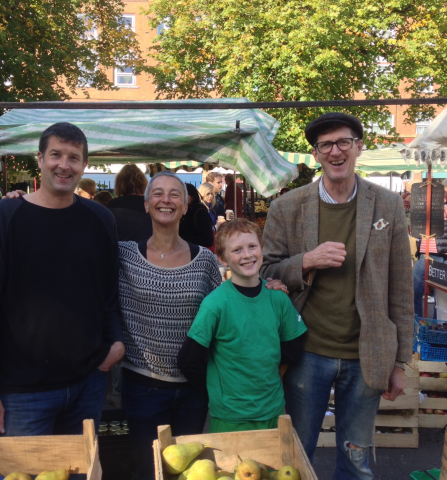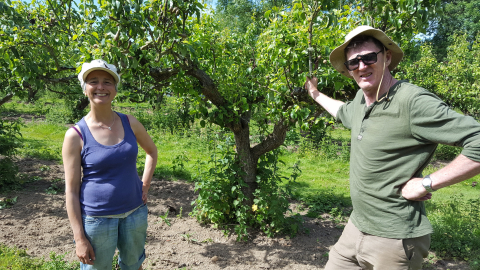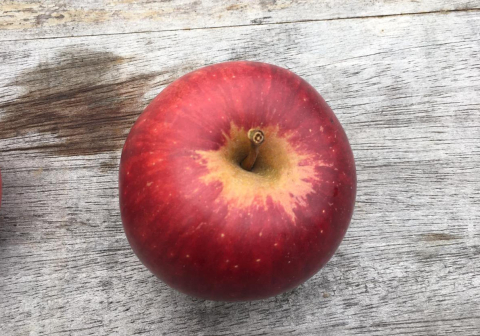I spoke to Natasha Soares about Pear Necessities, an organic orchard in Kent that supplies Growing Communities’ veg scheme and farmers’ market in Stoke Newington.
What do you grow (the clue’s in the name...)?
Not just pears actually! We grow top fruit – that’s fruit that grows on trees, not bushes: apples, plums, cherries, gages and pears.
How did Pear Necessities start and why?
Julie [founding director of GC] and Antony [her husband] were looking to invest in some land to use as a model for food growing just outside the city. They invited me and my partner Nick to join them in the venture. We were initially looking for meadowland or agricultural land to offer as a market garden opportunity. But then this piece of land came up – a 10-acre, 45-year-old pear orchard along with half an acre of woodland in Goudhurst, Kent. And then the 7-acre meadow next door came up for sale, so we combined these two pieces of land.
The year after we bought it, we planted up more trees – apples, cherries, plum and gages plus more woodland trees – and we restored the hedgerows.
We decided at the beginning to do everything as low input as we could. When we arrived there was no infrastructure. We put in mains water, a tool store, we built compost toilets and a lovely outdoor shower, which is very Heath Robinson. We also have a dance floor! There had been a shelter on the site but a large chestnut tree fell and crushed it. So we built a new shelter, with a reciprocal roof and a level floor, which happens to function really well as a dance floor for parties.

What kind of natural methods do you use to grow and what impact does this have on yield, local wildlife and biodiversity?
The original pear orchard is managed separately from the rest of the trees. There are 1600 pear trees, which we realised we couldn’t manage without lots of machinery. So we found a local organic farmer called Paul Ward of Mole End Farm and leased three-quarters of the pear orchard to him.
Paul manages the pears according to his organic regime. We manage the rest ourselves, pruning and harvesting our quarter of the orchard without any machinery. The partnership with Mole End has been amazing and we use Paul’s cold storage.
Paul is a brilliant fruit farmer; he has over 100 acres of mainly apples. He manages the pears in our orchard with a mixture of seaweed spray, and a range of other inputs – boron, magnesium, fungicide copper sulphate (allowed by the Soil Association) to prevent scab, which is something that builds up in soil. In our part of the orchard we’re doing things differently.
We planted the new fruit trees with big gaps to reduce the chance of disease. We consulted Marina O’Connell – a very experienced biodynamic farmer who used to supply GC. She brought insights into creating functional biodiversity, allowing a certain level of pests because they bring in the predators, encouraging the habitats for predators, managing the soil. Our approach is to mulch with woodchip every year to keep weed growth down around the trees. But we allow weeds to grow as much as possible in the aisles between the trees.
We used to mow everything because it was the convention to keep things tidy. Then we read Wilding by Isabella Tree and thought “we don’t need to do all that mowing!” So now we’re just mowing selected areas and letting the rest rewild itself. It’s into its second year now and it makes me so happy. Now the grasses grow tall and beautiful and it’s a haven for insects.
We weren’t exactly ignorant when we started. We had spent years working with organic farmers and introducing food growing in schools. But we didn’t know about the practicalities of farming, so we copied what other people did, what our neighbours wanted us to do. We’ve learned one very important thing about looking after land – it’s best to keep it untidy!
The benefits of rewilding are that it’s so much more wildlife friendly, requires less carbon and it’s cheaper (no mowing). It’s win win win!
There are a lot of orchards in Kent. What makes you different?
The key thing is we’re certified organic. That’s a priority for us. We’re lucky the markets we sell to are full of educated people who know that a bit of scab on their pear doesn’t matter.
In autumn orchards around here will be carpeted with perfect fruit that doesn’t have the right percentage of red or are not quite big enough to fit supermarket standard. Even though it’s registered as on-farm waste, it’s not. The waste is created by supermarkets and big wholesale buyers.
It’s hard to know which came first – supermarkets deciding we don’t like irregularity, or the customers deciding. Either way, our customers have more grit, and perhaps because we have a closer relationship with them, they are more understanding of imperfect fruit and, in most cases, positively embrace it.

What’s the business set-up?
We’re an unlimited partnership, a profit-making business. But we never make any profit, that’s the truth of it! We generate income every year. At the moment we make sure we cover our costs – travel, expenses etc. We’ve never paid any of the partners but we’ve saved money for future development. We all have day jobs and manage the orchard outside of those, which has a lot of challenges, especially when our kids were little.
What do you love about it?
The thing I’m really glad about is soil health. Charles Dowding really convinced me about not disturbing the soil. We suppress the weeds around the trees by putting cardboard down and a thick layer of woodchip mulch. One of our neighbours has a tree management business so he makes tonnes of woodchip. We build it up, it gets absorbed by the soil and creates such a good environment for the mycorrhizae, building the immune system of the trees.
As well as being a practical endeavour, we have a love affair with the land. We border a really large area of woodland just outside an Area of Outstanding Natural Beauty – the east-facing slope has beautiful views of the High Weald.

What’s hard about it?
Doing it in our spare time on top of a fairly demanding day job is challenging. Ordinarily we’d have a work party to help with mulching and the harvest. But since Covid-19 there’s been no volunteer activity. I miss that. We’re really privileged to have this land – so many people don’t have that – so I love to take people down to experience it. I used to bring cheeky ten-year-old boys down from my son’s school. And we’d bring the farm back to London – we used to do apple day at his school and get everyone involved in juicing grade-outs.
It’s easier to grow fruit than veg but even so you have to hold your nerve. When the trees we planted were young, the leaves were eaten by moth caterpillars. Were we doing the right thing? Would all the trees die? Despite this, we loved the approach of functional biodiversity. It’s hard work though. We’ve been managing the pests by hand – literally going around squishing bugs by hand – from 400 trees! But eventually it pays off. Not only has it been a bumper apple harvest this year, but we were delighted to discover clusters of ladybirds in the stalks of our apples. We thought “We’re going to have no aphids next year!”
Over the 13 years I’ve learnt it’s in the lap of the gods. You can do as much as you can to maximise soil and tree health but you can’t make it be warm and wind free at the right time. All you can do is celebrate when it is good, and cry when it’s not! You can’t control it.
Top fruit in France is mostly grown undercover using masses of plastic. Even though it’s warmer, French orchards still choose to protect their trees against the elements this way. And you can understand why, especially if your livelihood depends upon it.
What does the future hold?
For now we will keep growing fruit and selling to our communities in London. There is a question around the pear orchard: this year the harvest was minuscule. The trees are very old and not producing so well anymore.
Covid has thrown up a lot of uncertainties and also highlighted the need for access to the outdoors and connection to nature. We run a small campsite on the orchard and one of the questions is (when we can), do we want to increase access to the site for groups or focus more on fruit growing?
The discussion for us now centres around how do we best look after this piece of land while producing food. Wilding caused a massive shift for us. We’re on a huge learning curve now about how to manage land and grow food with enough balance. Each one of the four of us prioritises something different.
Managing a group in a cooperative way brings its own challenges but I’m a true believer in the cooperative approach because you have to face the difficult things in life and work through them. We always come to a joint decision in the end.
